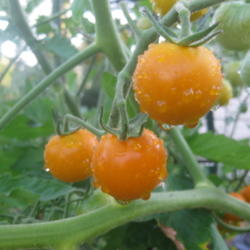
When do fruit ripen? Since varieties mature at different times, you can stretch your harvest over many weeks. If you're buying seeds to start your own plants, read catalog descriptions carefully to discover "days to maturity." This indicates approximately how soon you can expect ripe fruit once you've transplanting seedlings to the garden. Plants sold at garden centers are often labeled "early," "midseason," or "late" to indicate when the variety should start ripening.
Determinate vs. Indeterminate. Another consideration in choosing tomato varieties is whether the vines are determinate or indeterminate. Determinate plants stop growing once the flower buds emerge. Because of their more restrained size, many determinate varieties need no staking or caging, but providing support can improve the quality of the fruit. All the fruit ripens within a relatively short period of time - usually about a week to 10 days. This can be a boon if you're canning, but for the gardener who prefers to have a fewer number of tomatoes over a longer period of time, indeterminate varieties are better. The vines continue to grow and set fruit throughout the season, and won't quit until the weather turns too hot or too cold to sustain fruiting and growth, or kills plants outright.
For gardeners with little space to spare, or only a deck or balcony to grow on, patio and bush varieties are a good option. They're more compact than determinates, yet produce fruit throughout the season like indeterminate types. They are bred to succeed in small spaces.
What to do with the fruit? When selecting a tomato variety, keep in mind what you plan to do with the fruits. There are varieties suited for just about every purpose - eating fresh, making tomato paste, canning, drying - even for cultivating into a county fair prizewinner.
Seeds or Transplants. The easiest way to get your tomato patch started is to purchase young plants, also called transplants or starts. You can pick up plants at garden centers or order them through catalogs or the Internet. For years, gardeners who bought plants had a very narrow field of variety choices, but thanks to an expanding mailorder trade, the options are greater than ever.
That said, starting your own seed gives you an almost endless list of varieties to choose from, allowing you to get just the type that will suit your growing conditions and tastes. Starting seeds gives you a chance to start "gardening" earlier in the season, and nurturing plants from seed to harvest is a great experience. Plant seeds six to eight weeks before the last frost date for your region, and place them under flourescent light. (For seedstarting details go to Starting Tomatoes from Seed. Call cooperative extension Master Gardeners or your local weather service to find out your last spring frost date.
Disease resistance. By planting tomato varieties with built-in resistance to diseases, you can have a bit more control over your garden's success.
For instance, many tomato varieties are resistant to soil-borne diseases such as verticillium and fusarium wilts and nematodes. Most seed catalogs indicate resistance to these diseases by putting F (fusarium), V (verticillium), N (nematodes) after the variety name. You'll also see varieties with resistance to viruses such as tomato mosaic virus (T), and to alternaria (A), the fungus that causes early blight.
Talk to the Master Gardeners office or to neighboring home gardeners. They can tell you if certain tomato diseases are common in your area.
Experiment! If you're not counting on your garden as your only food source, you can certainly afford to risk planting the varieties that appeal to you - perhaps an heirloom that, though not resistant to disease, is reportedly produces the most delicious tomatoes in the world. Experimentation is part of the joy of gardening, and part of your harvest is what you learn along the way.
Photo by Suzanne DeJohn/National Gardening Association
 Victory Seed Company has all the seeds you want for your best garden in 2024.
Victory Seed Company has all the seeds you want for your best garden in 2024.
For 25 years, the family-owned Victory Seed Company has provided the highest quality vegetable, herb and flower seeds to families across the country. We are passionate about providing you the best seeds available that give excellent germination, robust plants, and the harvest you want. With a catalog of over a thousand varieties, we have everything, and our prices are the kinds that we'd want to pay. We have hundreds of yesterday's heirloom vegetables, as well as today's award winning hybrid selections. Get to know us by visiting our website and browsing through our online vegetable seed catalog.
| 1. Choosing Tomato Varieties ← you're on this article right now |
| 2. Starting Tomato Seeds |
| 3. Repotting and Transplanting Tomato Seedlings |
| 4. Hardening Off Tomato Transplants |
| 5. Garden Prep for Tomatoes |
| 6. Container Tomatoes |
| 7. The Great Tomato Race |
| 8. Tomato Essentials |
| 1. Choosing Tomato Varieties ← you're on this article right now |
| 2. Starting Tomato Seeds |
| 3. Repotting and Transplanting Tomato Seedlings |
| 4. Hardening Off Tomato Transplants |
| 5. Garden Prep for Tomatoes |
| 6. Container Tomatoes |
| 7. The Great Tomato Race |
| 8. Tomato Essentials |